This festive period, the chances are that you will have watched a film you have seen before – perhaps even a remake of a film you are already familiar with. This year saw at least 20 reboots and remakes, some of films that had barely had time to gather cobwebs in the interim. What Men Want was a loose remake of 2000's What Women Want, The Lion King was revisited last summer and Dumbo was a reimagining of Walt Disney's 1941 classic. Next year West Side Story, Gremlins and Top Gun get another outing, among others. Remakes have been around almost as long as cinema has. Films made in the 1920s and 1930s were remade with sound when the technology was introduced, and still later imbued with colour when that innovation came into being. Old stories are reinvigorated and told anew. So why is there a sense of déjà vu about every other film made today?
Two of Disney's biggest releases this year, Aladdin and The Lion King, were live-action remakes of animated films produced by it in the 1990s. Many moviegoers – including myself – were up in arms about the remakes and questioned their necessity, mainly because the originals were near-perfect and did not need to be updated with modern technology. Defenders of the Aladdin remake said even though the film was not that great, it at least introduced a whole new generation to the story – but the 1990s version had not gone anywhere. It can still be watched and enjoyed by people of all ages and is a vastly superior version.
Fans of The Lion King remake said the hyper-real technology used to recreate the animals was breathtaking and made it look as if they were watching real animals. To be sure, the technology is certainly impressive but the beloved classic still has merit. The only reason for retelling the story was to bring in paying audiences.

For the most part, remakes today do not do what they set out to do: namely, take a good film and make it better. All they end up doing is standing on the shoulders of better films and sell tickets based purely on nostalgia. Charlie's Angels was a point in case. The reboot of a reboot of a 1970s TV series, it currently sits at 51 per cent on the aggregate review website Rotten Tomatoes, barely justifying its existence. Despite its all-star cast, it did not even break even, making it a complete box-office flop.
This makes one wonder why movie producers bother trying to perfect something that already works, particularly if they are not improving the storytelling or making enough money to justify the cost. There are undoubtedly great remakes being made; the best, from the likes of Martin Scorsese, Brian De Palma, David Cronenberg and Steven Soderberg, are done so well, you would not know they were remakes at all.

If you believe author Christopher Booker, there are only seven basic plotlines and most stories are simply a reimagining of one of them, whether it is the idea of overcoming the monster, rags to riches, a quest, a voyage and return, comedy, tragedy or rebirth. Some remakes attempt to merge multiple plots while others try (and mostly fail) to improve upon a previous storyline.
So rather than familiarity breeding contempt, remakes could be justified as either homages or blamed on the fact there is very little room for originality to begin with.
Take De Palma and his remake of the 1932 film Scarface. The two versions share the story of the rise and fall of an ambitious gangster. But in De Palma's 1980s version, the gangster is a Miami drug baron, driving flashy cars and living in opulent mansions. His remake was successful because it made an old story relevant and relatable to an audience of its time. Cinemagoers were taken aback by the violence – an addition to the story – but were also captivated by the decadence on screen.
To better understand remakes, we need to also understand what differentiates them from reboots and homages. Reboots have become popular recently because film studios hope to monetise an existing product, without angering fans. Unlike remakes, reboots present a completely different story but with already established characters.
An homage is essentially what Quentin Tarantino has made a career out of. Sometimes it's a straight copy; other times it's an Easter egg left by the director in tribute to a film or another director he or she loves. Reservoir Dogs, for example, was all but completely lifted from a Hong Kong film called City on Fire.
Remakes, reboots and homages are not going away any time soon. Studios keeping an eye on box-office returns see them as money-spinners and will continue to bring them to a screen near you. That does not mean you cannot see original filmmaking; you just have to seek it out at film festivals, independent cinemas and on streaming services. It's a challenge to find nuggets of gold but especially rewarding when you do.
Faisal Salah is a social media journalist for The National




